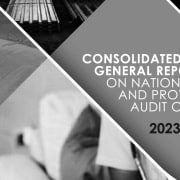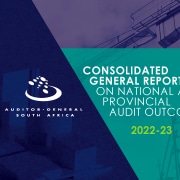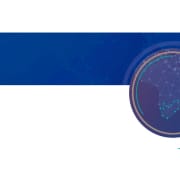|
Getting your Trinity Audio player ready...
|
By Kwazi Dlamini
The Auditor-General’s office recently released its yearly audit results of local government in Gauteng. Results were presented by Dumisani Cebekhulu, the business executive responsible for Gauteng province at the Auditor-General of South Africa (AGSA). Cebekhulu revealed that all municipalities sustained their outcomes from the previous year which meant that Gauteng was the only province with 100% unqualified audit opinions.
However, Cebekhulu cautioned, non-compliance with legislation remains the main stumbling block preventing many municipalities in Gauteng from achieving a clean audit. This year’s report showed that 52% of Gauteng municipalities achieved a clean audit.
“We remain concerned by the status of compliance with legislation by municipalities in the province,” he said. “Overall, compliance outcomes regressed due to the slow response by leadership to address the weak control environment and a lack of consequences which resulted in findings on compliance with legislation at most municipalities.”
There is also a problem with procurement issues and performance reporting, Cebekhulu said. “Forty-five percent of municipalities in Gauteng are in a vulnerable financial position which cause for concern.”
The AG’s findings showed that performance reporting did not receive the needed urgent attention, and in fact regressed in municipalities like Midvaal, City of Ekurhuleni, Merafong and West Rand City. These annual performance reports require further improvement, Cebekhulu said.
Irregular expenditure increasing
AGSA is concerned about the increase in irregular expenditure within Gauteng municipalities, Cebekhulu noted. However, he also expressed that the AG is encouraged by where most municipalities are positioned, as there is an opportunity for improvement. The report revealed that metropolitan municipalities are the biggest contributors to irregular expenditure – namely Ekurhuleni, Tshwane and City of Johannesburg.
Statistics from Corruption Watch’s in-house researcher Melusi Ncala show an alarming volume of corruption engulfing these metros. Bribery is the biggest form of corruption reflected by our statistics as it consistently appeared on reports received from the metros – this also includes bribes made in order to get a job.
Embezzlement of funds appeared frequently – this reflects in AGSA’s statement on irregular expenditure being very high in these metropolitans, especially in Ekurhuleni.
Our data also showed an ongoing increase in irregular procurement from all Gauteng metros from 2016 to 2017, which means many tenders were given out without following proper procedure. Tshwane has high numbers of incidences of bribery for jobs, which also reflects in recent media reports of the metro recruiting unqualified people for senior positions. Irregular procurement and appointments played a role in the Tshwane municipal manager’s suspension, pending an investigation.
According to the AGSA report, irregular expenditure increased from R1 291-million in the previous year to R3 653-million in the year under review. Cebekhulu attributed the increase to non-timeous investigations related to findings, as well as delayed consequences for non-compliance.
“We reported material non-compliance with legislation dealing with consequences at 64% of the municipalities. This lack of consequences is also evident in municipalities again not paying sufficient attention to the findings on supply chain management that we reported and recommended for investigation,” he added.
Accountability and control
Cebekhulu lauded other municipalities for doing well in obtaining unqualified audits in consecutive years. “Midvaal is commended for sustaining a clean audit outcome for the last four years. This was as a result of the municipality institutionalising a number of best practices which should be replicated across the province, such as timeously monitoring the implementation of action plans to ensure that internal control deficiencies are addressed, maintaining stability in key positions, and effectively applying the necessary consequences.”
The Rand West City municipality was singled out for doing well after it had also received an unqualified audit opinion. However, Cebekhulu emphasised that accountability in local government needs to be improved. Strong leadership is needed to set the tone for accountability in confronting the root cause of the audit findings and improving the control environment.
He said AGSA had previously urged management and leadership to take actions that would encourage sustainable good governance, but according to the latest findings this request was not taken seriously.
• Image from Wikipedia








